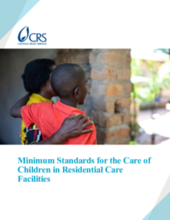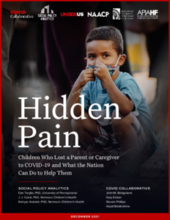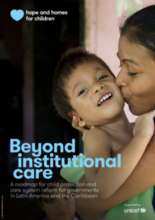Demographic Data
|
Sources: World Bank, UNDP, UNAIDS, DHS 2013 |
Displaying 2161 - 2170 of 14391
Este estudio de caso destaca algunos de los requisitos previos para el punto de partida de una transición exitosa de la atención residencial a un modelo no residencial, muchos de los cuales a menudo se pasan por alto o se subestiman. El estudio de caso se organiza en torno a las distintas etapas de la transición y explora algunos de los temas clave descritos en la Herramienta de evaluación de modelos de atención en transición.
This document presents a set of minimum standards of care, which it is recommended that residential care facilities (RCFs) strive to adopt, particularly those RCFs engaged with or receiving support from CRS. The standards are designed to be applicable to a variety of residential care settings and are recommended to be used to promote care practices and approaches that contribute to positive child well-being.
Among the more than 760,000 deaths from COVID-19 in the United States are parents, custodial grandparents, or other caregivers on whom children had relied for financial, emotional, and developmental support. Many of these children already faced significant social and economic adversity, and these devastating losses can impact their development and success for the rest of their lives. This report estimates the number of children who lost a parent or other caregiver to COVID-19 and provides concrete recommendations for urgent actions to protect these vulnerable children and their remaining caregivers.
Au-delà des soins institutionnels fournit un cadre aux gouvernements pour développer leur propre feuille de route pour la réforme et la désinstitutionnalisation du système de protection et de garde des enfants. Nous espérons qu'il inspirera une conversation, guidera le dialogue interministériel et interprofessionnel, soutiendra les groupes multidisciplinaires à tous les niveaux pour encadrer leur propre évaluation et planifier leur propre feuille de route pour le changement.
Más Allá del Cuidado Institucional proporciona un marco para que los gobiernos desarrollen su propia hoja de ruta para la reforma de sus sistemas de protección y cuidado infantil y la desinstitucionalización. Esperamos que esto inspire el diálogo, guíe las conversaciones entre grupos interministeriales y en la sociedad, oriente a grupos
multidisciplinarios de todos los niveles en la creación de su propia evaluación y ayude en la planificación de su propia hoja de ruta para el cambio.
This report provides a framework for governments to develop their own roadmap for child protection and care system reform and deinstitutionalisation. The authors hope that it will inspire a conversation, guide inter-ministerial and cross society dialogue, support multidisciplinary groups at all levels to frame their own assessment, and plan their own roadmap for change.
As UNICEF commemorates its 75th year, this report lays out the work in front of us by taking stock of the ongoing impact of COVID-19 on children and the road to respond and recover to reimagine the future for every child.
Overtime, and after realising the full cost of running even a small residential program, and witnessing first-hand the developmental gains made by children once placed in foster care, Child’s i Foundation made a decision to fully transition and phase out their residential care program entirely.
Across the country, an unregulated system is severing parents from children, who often end up abandoned by the agencies that are supposed to protect them.








